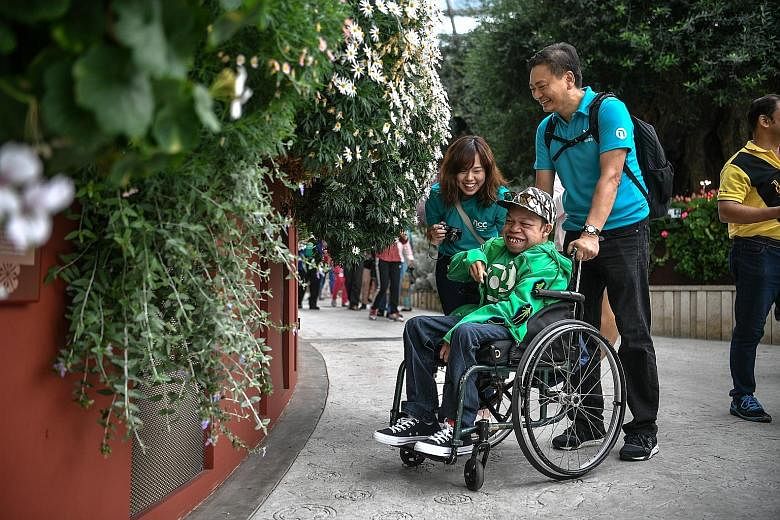At the age of 28, Mr Muhammad Idham Fayumi Ruslan feels trapped by his debilitating illness - he is totally dependent on his parents for his every need.
He suffers from mucopolysaccharidosis, a metabolic disorder that affects different parts of the body, and his muscles are wasting away.
The young man has to use a wheelchair, and his sight and hearing are deteriorating.
With nothing much he can do to occupy his time at home, the brightest spot in his life is when he goes on outings organised by Awwa to places such as Gardens by the Bay and Science Centre.
Awwa is a charity serving people with disabilities. Two to three times a week, its staff visit Mr Idham at his home for physiotherapy and other therapy sessions, to prevent his muscles from weakening even more.
In 2014, the Ministry of Social and Family Development (MSF) piloted home-based care services for people like Mr Idham.
By bringing therapy and other personal care services they need to their homes, this helps their families to continue looking after them at home.
Awwa's assistant director of caregiver service (disability), Ms Sandra Tan, says that many using its home-based care services are in their 30s and older, and have never gone to school. They suffer from multiple disabilities, being both physically and intellectually disabled.
Their parents are relieved to get such help as it gives them some respite from looking after their child round the clock.
Mr Seah Leng Thiam, 64, had to quit his construction job when his son, Mr Geok Lim, 33, suffered a serious head injury during his reservist training a few years ago. He lost control of his limbs and became unable to care for himself.
Mr Seah says: "It is very tiring and stressful to look after my son as I have to help him with everything. When the Awwa staff are here, I can relax. I also don't feel the despair that I felt before I received help from Awwa."
The home-based care service is subsidised by the Government to up to 80 per cent of the fees for the lowest-income group.
Those with a per capita monthly household income of $700 or less pay as little as $40 to $140 a month after subsidy, says an MSF spokesman.
Families with a per capita household income of up to $2,600 a month qualify for subsidies. Besides Awwa, the Movement for the Intellectually Disabled of Singapore also runs this programme.
Mr Idham's father, housekeeping supervisor Ruslan Japar, 68, says: "It's very sad to see my son in this condition but at least the Awwa staff come and help him strengthen his muscles and talk to him. He is not so bored and is very excited to go for the outings."
Theresa Tan

